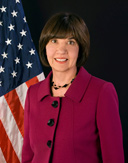Media  Statements & Speeches
Statements & Speeches
Commissioner Cheryl A. LaFleur Statement February 16, 2012 Docket No. RM96-1-037 Item No. G-1 |
Standards for Business Practices for Interstate Natural Gas Pipelines
“I would like to thank the team as well as the staff and volunteers at NAESB for your work on this Proposed Rule. The new standards are a helpful step in beginning to address the operational interdependence of the electric and gas networks. I would also like to acknowledge the very helpful work being done by NERC in this area, particularly their December 2011 Special Reliability Assessment.
As my colleagues have mentioned, the electric industry’s increased reliance on natural gas has greatly heightened the need to address how these markets and operating networks can better work together. I hope that we receive a wide range of comments from diverse market participants in response to the request for comments issued yesterday.
In particular, I would like to highlight five aspects of gas and electric interdependence that I believe should be considered, and on which I would appreciate receiving comments. The first, most relevant to today’s rulemaking, is coordination and communication between the gas and electric industry to maintain reliability during weather or outage events. Second, I would welcome comments on new pipeline and storage service and pricing structures that might better meet the emerging needs of generators. The third area is scheduling protocols for gas pipelines and electric generation facilities. The fourth area is electric reliability standards, and whether there is a need to include standards about fuel supply to support reliability. Finally, I invite comments on how we can improve the Commission’s work on pipeline and storage infrastructure to ensure that the gas infrastructure is in place to support the nation’s growing reliance on gas for generation.
Recently, there has been much discussion of gas/electric interdependence in connection with the Southwest cold weather event in early 2011. I personally experienced a near-miss situation seven years earlier in New England in January 2004. I was in a storm room preparing for rolling blackouts that were narrowly averted, when extreme cold weather led to increased demand for gas for heating and threatened the availability of gas for electric generators. As a result of that near-miss experience, ISO New England and market participants developed new operating procedures that were approved by this Commission.1 Today, New England is even more dependent on gas than it was in 2004, and has ongoing challenges to ensure adequate future gas infrastructure.
I expect that we will be seeing more cases that are driven by issues related to gas/electric interdependence. I know that a number of the RTOs and ISOs are currently working on this issue, and I expect that we will receive proposals to address different aspects of the issue. I also hope that the comments we receive will suggest areas where the Commission itself should initiate action where appropriate. Thank you.”
--------------
1.
ISO New England, Inc., 117 FERC ¶ 61,082 (2006). For more detail on the New England 2004 experience, see “ISO New England’s Management Response to the October 12, 2004 publication entitled Final Report on Electricity Supply Conditions in New England during the January 14-16, 2004 “Cold Snap”” (Oct. 12, 2004), available at http://www.iso-ne.com/pubs/spcl_rpts/2004/iso_management_response_cold_snap.pdf ![]() .
.






